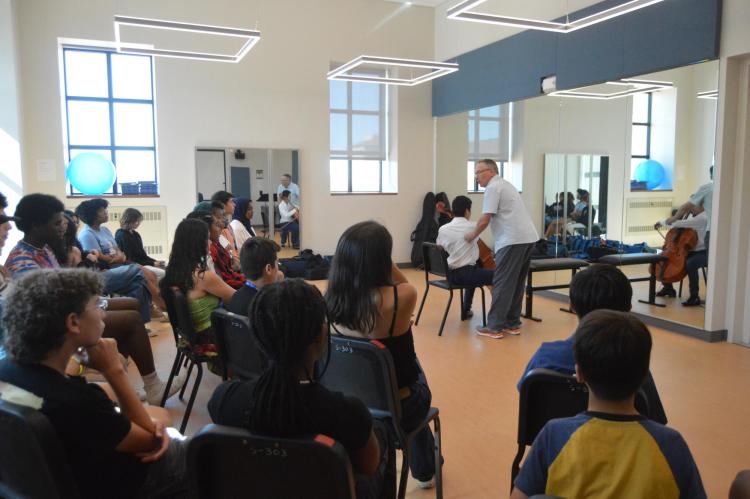CU Boulder hosts national music program to advance diversity in classical music
This summer, young string musicians from across the country came together at CU Boulder’s College of Music to hone their craft and advance a culturally diverse future of music at the Sphinx Performance Academy (SPA) summer camp.
Pictured: 16-year-old Savonte Vaughn plays viola at the Imig Music building. Video by Nico Goda.
The Sphinx Organization, launched in 1997 in Detroit, aims to empower string musicians from underrepresented communities nationwide and prepare them for professional careers in classical music. To expand its repertoire of offerings, the organization introduced SPA in 2004—which hosts a series of full scholarship summer camps for Black and Latinx students, ages 11–17.
The College of Music partnered with SPA to host their summer intensive this June. This is the first time the organization has hosted their program at a flagship university. Other Sphinx collaborators include the prestigious Juilliard School in New York City and the Cleveland Institute of Music.
Following the U.S. Supreme Court’s decision to roll back affirmative action, educators nationwide are prioritizing diversity initiatives. But the need to address the issue isn't new, especially among musicians.
A 2016 study from The League of American Orchestras looked at 500 American orchestras and found that less than 15% of musicians were non-white.
“There is a serious issue of underrepresentation in classical music,” said SPA Director of Education Ana Abrantes. “We're trying to address this issue across the country, and that has to come from youth.”
In 2022, SPA served 80 students and awarded more than 340 scholarships to Sphinx education programs. Through their many free offerings for string players of all ages and abilities, the organization continues to work toward a more diverse classical music industry.
“I’ve grown so close to all the musicians here over the last week,” said Nicolas Bussalleu, a 16-year-old viola student from Miami, Florida. “Being able to play with people that you relate to and identify with touches you in a way that can’t be matched by anything else.”

James Brody, director of CU Boulder’s Musicians’ Wellness Program, works with SPA students in a technique class. Credit: Linton Robinson/SPA.
During their 10-day stay in Boulder, students lived in the dorms, attended master classes, received individual lessons, took part in career enrichment sessions and performed in recitals to showcase what they’ve learned—all supported by the College of Music’s Dean’s Annual Fund.
They were also able to view the Helen Walker Hill Collection housed at the American Music Research Center on campus, which contains compositions by Black women composers, curated by the late CU Boulder alumna and professor Helen Walker Hill.
“At CU we have a world-class music school, but also world-class academics and collections. And that is something really special to this campus that the students won't necessarily experience in a conservatory environment,” said Alex Gonzalez, an SPA affiliate and assistant violin professor at CU Boulder.
Gonzalez’ involvement with Sphinx began in 2013 when he entered the Sphinx Competition, which gives Black and Latino string musicians the opportunity to win cash prizes, scholarships and more. Since then, he’s taken on many roles across the organization and was responsible for bringing SPA to Boulder.
Having grown up with a Black mother and a Mexican father, Gonzalez has a personal investment in the program. He feels it is important for him to provide similar opportunities to young Black and Latinx musicians.
“I was very lucky to have a family that could afford my music education and professors that supported me in my professional career, but I know that’s not the case for everybody,” he said. “Now that I’m in a capacity and position to do that for other people, it's very important to me that I pay it forward.”


